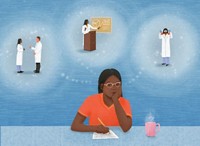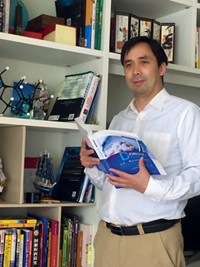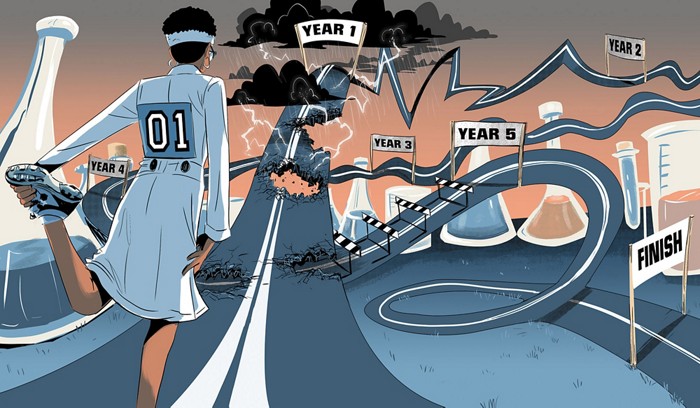Advertisement
Grab your lab coat. Let's get started
Welcome!
Welcome!
Create an account below to get 6 C&EN articles per month, receive newsletters and more - all free.
It seems this is your first time logging in online. Please enter the following information to continue.
As an ACS member you automatically get access to this site. All we need is few more details to create your reading experience.
Not you? Sign in with a different account.
Not you? Sign in with a different account.
ERROR 1
ERROR 1
ERROR 2
ERROR 2
ERROR 2
ERROR 2
ERROR 2
Password and Confirm password must match.
If you have an ACS member number, please enter it here so we can link this account to your membership. (optional)
ERROR 2
ACS values your privacy. By submitting your information, you are gaining access to C&EN and subscribing to our weekly newsletter. We use the information you provide to make your reading experience better, and we will never sell your data to third party members.
Graduate Education
Covid-19
Chemistry departments deal with coronavirus closures
Amid university shutdowns worldwide, professors and students adjust what social distancing means for lab scientists
by Andrea Widener
March 19, 2020
| A version of this story appeared in
Volume 98, Issue 11

Just last week, it was business as usual in the University of Rochester’s chemistry department. But now chair Todd Krauss is juggling the sudden adoption of online-only classes and the restriction of campus to essential personnel to avoid infection with COVID-19, the disease caused by the coronavirus SARS-CoV-2.
For now, professors and grad students can come on campus, Krauss says. But with the coronavirus spreading in the local community, he thinks it’s just a matter of time before labs are completely closed down.
Across the world, universities are learning to deal with what is now a new normal: closed campuses, homebound colleagues, and online teaching.
Support nonprofit science journalism
C&EN has made this story and all of its coverage of the coronavirus epidemic freely available during the outbreak to keep the public informed. To support us:
Donate Join Subscribe
Krauss is pushing his department’s faculty and students to employ social distancing measures, such as putting labs on staggered shifts so people can spread out, letting people work from home, and conducting meetings remotely. He’s hoping researchers can collect as much data as possible now so they can work from home to analyze it once labs are completely inaccessible. But that’s not a perfect fix.
“We have to accept the fact we are going to be less productive in the long term,” Krauss says. “If you can really do your part this won’t be catastrophic, and we can get back to normalcy sooner.”
Meanwhile, universities are doing what they can to help ease people’s fears about an unknown future. For faculty, they are extending tenure clocks to allow early career professors to make up for lost time. For students, some schools are switching grading to pass or fail. Most US and European teaching assistants and research-funded students are getting paid while they teach or work remotely.
At the Swiss Federal Institute of Technology in Lausanne (EPFL), where all buildings are closed, students are expected to write papers, do literature searches, and work on data analysis while they are home.
“Even though some experiments and laboratory measurements won’t be possible for a while, they can still do some of their work remotely,” spokesperson Sarah Aubort says. “The delays in their PhD should therefore be minimal, unless the situation goes on for many months.”
University of Michigan chemistry graduate student Jessica Tami’s advisor told their lab members to start working from home, and the group plans to use video conferencing software for group and individual meetings.
For now, Tami has plenty of work that can be done remotely, though she doesn’t have as much data as she would like for a preliminary meeting with her thesis committee currently scheduled for early May.
Tami admits she is “nervous about the situation, both globally and personally.” If the closures go on long-term, she isn’t sure what will happen. “At the end of the day, I am a synthetic chemist, and I will need to do experiments in lab,” Tami says.
Javier García Martínez, a chemistry professor at the University of Alicante, hopes students who run out of work will take the opportunity to learn new skills online.
Money that isn’t being spent on daily lab needs like chemicals might be redirected, García Martínez says. “We could be using some of that funding to support online education of our students.”
Making sure students nearing the end of their education feel successful is another goal of many faculty. The University of Bologna started shutting down at the end of February, but faculty realized they shouldn’t postpone graduation indefinitely for master’s students in the chemistry and pharmaceutical science program. So three professors met in a classroom and students connected remotely for a defense and then a ceremony.
“The students were so happy and so motivated. That was to me something very moving,” says professor Maria Laura Bolognesi.
Faculty also have to adjust from the frantic pace many faced before the shutdowns. Working from home has given Shanghai Institute of Organic Chemistry professor Shuli You a different perspective on work-life balance. Students left at the end of January and have not been able to return.
You says social distancing has allowed him to spend more time at home with his wife, catch up on reading books and journal articles, and exercise every day. And it’s given him more gratitude for the science he’s doing, he says. “Certainly, going through this difficult situation, I’ll enjoy my work much better. I’ll enjoy my life much better.”
With additional reporting by Laura Howes; Linda Wang; and Paula Dupraz-Dobias, special to C&EN
UPDATE
This story was updated on April 7, 2020, to add additional reporting credit.






Join the conversation
Contact the reporter
Submit a Letter to the Editor for publication
Engage with us on Twitter